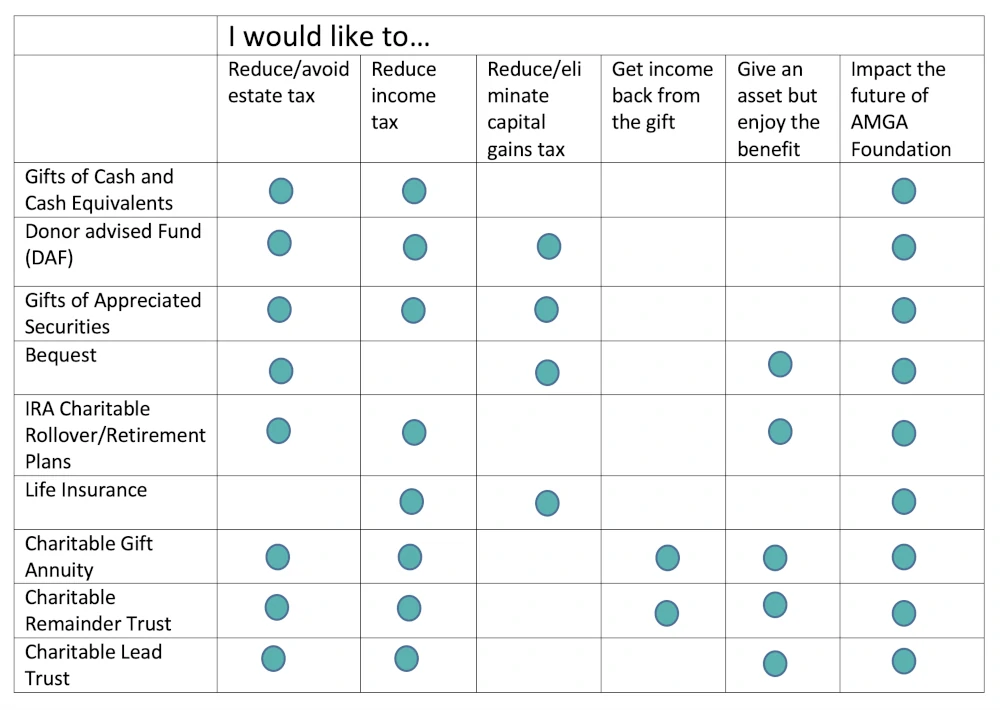AMGA Foundation: Donate

Donate to AMGA Foundation
Please make a contribution and help us sustain, grow, and advance our programs to tackle more conditions and improve care for more patients.
A gift to AMGA Foundation impacts millions of lives, shapes Foundation priorities, and allows us to collectively achieve higher quality, improved patient experiences, lower costs, and more satisfied clinicians. AMGA member dues go a long way to support the work of AMGA, but AMGA Foundation’s programs and initiatives are solely funded by the philanthropic support of our groups, individual members, and corporate partners. Without their generosity, the Foundation would not be successful in transforming healthcare today and achieving our vision of improving patient care.
To make our vision a reality we need your help. Your gift will help us advance best practices and innovate a more efficient model of care benefitting millions more patients, families, and communities nationwide. For more information on how your gift will pave essential pathways toward a healthier tomorrow please review our case for support.
Please make a contribution and help us sustain, grow, and advance our programs to tackle more conditions and improve care for more patients. Donate today!
Medical Group Gift
Donate to AMGA Foundation
Please make a contribution and help us sustain, grow, and advance our programs to tackle more conditions and improve care for more patients.
– Aileen Mickey, MD, MHA, President, MaineHealth Medical Group
Ways to Give
There are many ways donors can make an impactful gift to AMGA Foundation. Explore all the ways you can give below:

You can make a gift to AMGA Foundation easily and securely online. Your gift will help us to immediately invest in critical resources and initiatives to help advance our mission. Donate Now. You may also contribute via check made payable to AMGA Foundation and addressed to:
AMGA Foundation
One Prince Street
Alexandria, VA 22314-3318
For a personal discussion about which planned giving options are right for you and your family, please contact Christina Santos at philanthropy@amga.org.
- Bequest
Bequest gifts are a meaningful way to leave a legacy and create an impact for future generations. AMGA Foundation may accept designation as beneficiary of wills and trusts.
- IRA Charitable Rollover/Retirement Plans
AMGA Foundation may accept designation as beneficiary of a retirement plan. If you are over the age of 70 ½, giving through an IRA Charitable Rollover helps you avoid paying taxes on thransfters of up to $100,000, while still allowing you to satisfy your required minimum distribution (RMD).
- Gifts of Life Insurance
Gifts of life insurance policies are an effective way to advance philanthropic priorities.
Meet Our Donors
Thank you to our donors for your outstanding commitment to the vital work of the Foundation and our vision to create a heathier tomorrow. Because of your generosity, we continue to sustain, elevate, expand, and innovate quality initiatives that tackle more chronic conditions and reach more patients. As a result, millions of patients are now heart healthy, have lower blood pressure, have improved diabetes control, receive better cancer screening, and are immunized. We are grateful!
Please read our Impact Report honoring our donors and celebrating our programmatic impact. Learn more about the individuals, medical groups, health systems, and corporations that provided support in 2023. Together, we are changing the course of chronic and preventable diseases in the U.S.